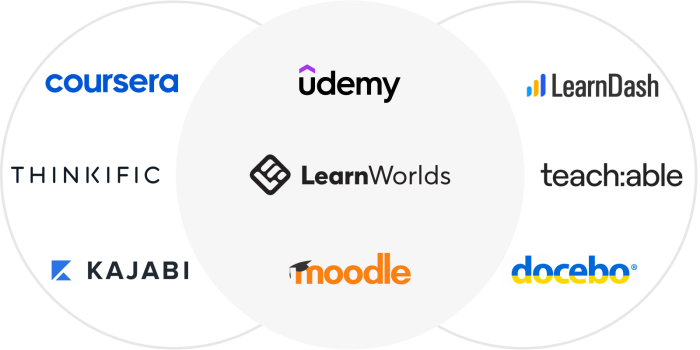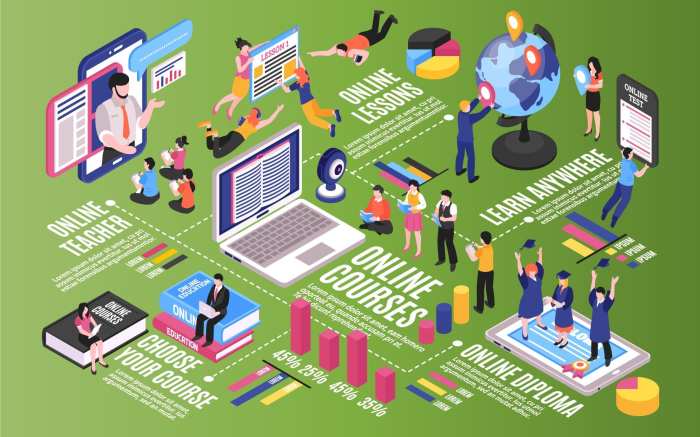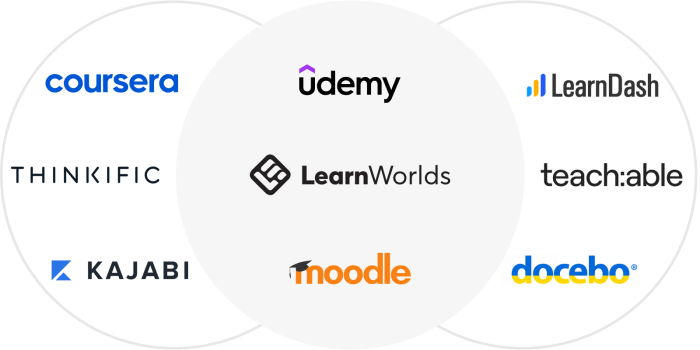
Find the Best Online Course Platforms for Your Needs
Best online course platforms have become a game-changer for educators and learners alike. With the rise of remote learning and the desire for flexible education options, online platforms offer a fantastic way to share knowledge and acquire new skills.
Whether you’re a seasoned instructor looking to build your online presence or an aspiring entrepreneur eager to launch your first digital course, choosing the right platform is crucial.
From robust learning management systems (LMS) to user-friendly course creation tools, the best online course platforms offer a diverse range of features to cater to different needs. This guide will explore some of the top contenders, delving into their unique strengths and weaknesses to help you make an informed decision.
Online Course Platforms: Your Gateway to Learning: Best Online Course Platforms
In today’s digital age, online course platforms have revolutionized the way we learn. They offer a convenient and accessible way to acquire new skills, knowledge, and expertise from the comfort of our homes. The growing popularity of online courses can be attributed to several factors, including the increasing demand for flexible learning options, the availability of diverse course offerings, and the affordability compared to traditional education.
Key Features to Consider When Choosing a Platform
Choosing the right online course platform is crucial for a successful learning experience. Here are some key features to consider:
- Course Selection:A wide variety of courses across different disciplines and levels, catering to diverse learning needs and interests.
- Instructor Quality:Experienced and qualified instructors with proven expertise in their respective fields, ensuring high-quality instruction.
- Learning Format:Flexible learning options, such as video lectures, interactive quizzes, discussion forums, and downloadable materials.
- Platform Interface:User-friendly and intuitive platform design, making navigation and course access seamless.
- Community Support:Active learning communities and forums, providing opportunities for interaction and collaboration among learners.
- Certification and Recognition:Option to earn certificates or diplomas upon successful completion of courses, enhancing career prospects.
- Customer Support:Responsive and helpful customer support team to address any technical or learning-related issues.
- Pricing and Payment Options:Transparent and competitive pricing models, with flexible payment options to suit different budgets.
Top Online Course Platforms

Choosing the right online course platform is crucial for success. Each platform has its unique strengths and weaknesses, catering to different needs and audiences. This guide will explore some of the most popular platforms, providing a comprehensive overview of their features, pros, and cons.
Top Online Course Platforms
This section will delve into the top online course platforms, providing a comparative analysis of their key features, advantages, and drawbacks.
| Platform Name | Key Features | Pros | Cons |
|---|---|---|---|
| Thinkific |
|
|
|
| Teachable |
|
|
|
| Podia |
|
|
|
| Kajabi |
|
|
|
Factors to Consider When Choosing a Platform

Selecting the right online course platform is crucial for the success of your educational endeavors. A well-chosen platform can enhance your learning experience, streamline course management, and boost student engagement. However, with numerous options available, it’s essential to consider several factors to ensure you make an informed decision.
Budget
The cost of online course platforms can vary significantly, ranging from free options to premium plans with advanced features. It’s important to assess your budget and determine the features you’re willing to pay for.
- Free platforms: These platforms often offer basic features, suitable for simple courses with limited functionality. Examples include Google Classroom and Moodle.
- Paid platforms: These platforms typically provide more advanced features, such as marketing tools, analytics, and integration with other applications. Examples include Teachable, Thinkific, and Podia.
Consider the size and scope of your course, the number of students you anticipate, and your long-term goals when determining your budget.
Target Audience
Understanding your target audience is essential in selecting a platform that meets their needs and preferences.
- Learning style: Some platforms cater to specific learning styles, such as visual learners, auditory learners, or kinesthetic learners.
- Technical proficiency: The platform’s user interface and features should be intuitive and easy to navigate for your target audience.
- Accessibility: The platform should be accessible to students with disabilities, ensuring inclusivity and equitable learning opportunities.
By understanding your target audience’s characteristics, you can choose a platform that aligns with their learning needs and preferences.
Course Content
The type of content you plan to deliver plays a significant role in platform selection.
- Text-based courses: Platforms with robust text editing features, such as WYSIWYG editors and formatting options, are suitable for delivering text-based courses.
- Multimedia courses: Platforms that support multimedia content, such as videos, audio recordings, and interactive elements, are essential for engaging learners with rich media.
- Interactive courses: Platforms with built-in features for interactive learning, such as quizzes, polls, and discussion forums, can enhance student engagement and knowledge retention.
Consider the specific content requirements of your course and choose a platform that can accommodate your needs.
Learning Objectives
Clearly defined learning objectives are crucial for selecting a platform that supports your teaching goals.
Finding the right online course platform can be a bit like searching for the perfect paintbrush – it all depends on your needs. Some platforms are great for photography courses, and that’s where a Picsart Plus 1-year membership could be a game-changer.
With its advanced editing tools and creative resources, Picsart can take your photography skills to the next level. Ultimately, the best online course platform is the one that provides the right tools and resources to help you achieve your goals.
- Knowledge acquisition: Platforms with comprehensive content delivery features, such as lesson plans, quizzes, and assessments, are ideal for knowledge-based courses.
- Skill development: Platforms with features for practical exercises, simulations, and project-based learning are essential for developing specific skills.
- Community building: Platforms with social features, such as discussion forums, group projects, and student feedback mechanisms, foster a sense of community and collaboration among learners.
Choose a platform that aligns with your learning objectives and provides the necessary tools to achieve your teaching goals.
Choosing the best online course platform can feel overwhelming, with so many options available. But sometimes, the best decisions are made by staying true to your vision, like Rivian’s CEO who says they’re never adopting CarPlay. This unwavering commitment to their unique vision, I believe, is a key factor in their success.
Similarly, when selecting a course platform, prioritize one that aligns with your teaching style and learning goals, ultimately enhancing your educational journey.
Features and Functionalities
The features and functionalities offered by online course platforms can vary significantly.
Finding the right online course platform can be a challenge, especially if you’re looking for something specific like mastering a powerful tool like PowerShell. If you’re interested in diving into the world of automation and scripting, I highly recommend checking out powershell the smart persons guide.
Once you’ve got a handle on PowerShell, you’ll be ready to tackle any online course platform with confidence, knowing you have the tools to automate your learning journey!
- Course creation tools: Look for platforms with intuitive course creation tools, such as drag-and-drop interfaces, templates, and pre-built modules.
- Content management: The platform should provide robust content management features, allowing you to easily organize, upload, and manage course materials.
- Student engagement: Platforms with interactive elements, such as quizzes, polls, and discussion forums, can enhance student engagement and motivation.
- Assessment tools: Look for platforms with built-in assessment tools, such as quizzes, exams, and feedback mechanisms, to track student progress and provide feedback.
- Analytics and reporting: Choose a platform that provides comprehensive analytics and reporting, allowing you to monitor student engagement, track performance, and identify areas for improvement.
- Marketing and promotion: Some platforms offer marketing and promotional tools, such as landing pages, email marketing, and social media integration, to help you reach a wider audience.
- Customer support: Choose a platform with reliable customer support, providing assistance with technical issues and platform features.
Prioritize the features that are essential for your course and choose a platform that meets your specific needs.
Tips for Finding a Platform
- Research and compare: Explore different platforms, read reviews, and compare features and pricing.
- Try free trials: Most platforms offer free trials, allowing you to test the platform’s features and functionalities before committing to a paid plan.
- Seek recommendations: Ask other educators or online course creators for recommendations based on their experiences.
- Consider your long-term goals: Choose a platform that can accommodate your future growth and expansion plans.
- Prioritize user experience: Select a platform with a user-friendly interface and intuitive navigation, ensuring a positive experience for both you and your students.
By following these tips, you can increase your chances of finding a platform that aligns with your goals and values.
Benefits of Using Online Course Platforms
The rise of online learning has revolutionized education, making it more accessible and flexible than ever before. Online course platforms play a pivotal role in this transformation, offering a multitude of advantages for both learners and educators. These platforms provide a robust infrastructure for creating, delivering, and managing online courses, enabling educators to reach a wider audience and learners to acquire knowledge and skills at their own pace.
Accessibility and Flexibility
Online course platforms break down geographical barriers, making education accessible to individuals worldwide. Learners can access courses from anywhere with an internet connection, regardless of their location or time constraints. This flexibility allows individuals to pursue their educational goals without disrupting their work, family, or personal commitments.
Cost-Effectiveness
Online course platforms are generally more cost-effective than traditional classroom-based learning. They eliminate the need for physical infrastructure, such as classrooms and equipment, and reduce administrative costs. This affordability makes education more accessible to a wider range of individuals, particularly those who may not be able to afford traditional education.
Scalability
Online course platforms offer unparalleled scalability, enabling educators to reach a large number of learners simultaneously. This allows for efficient delivery of educational content to a diverse audience, making it possible to cater to the needs of a large learner base.
Data Tracking and Analytics
Online course platforms provide valuable data tracking and analytics capabilities, allowing educators to monitor learner progress and identify areas for improvement. This data-driven approach enables educators to personalize learning experiences and optimize course content based on learner performance and feedback.
Challenges of Using Online Course Platforms
While online course platforms offer numerous advantages, they also come with certain challenges that learners and educators need to be aware of. These challenges can impact the learning experience and overall effectiveness of online education.
Technical Difficulties
Technical difficulties are a common challenge associated with online learning platforms. These issues can range from simple connectivity problems to complex software glitches.
- Internet connectivity issues: A stable internet connection is crucial for accessing online courses. Interruptions or slow speeds can disrupt the learning process, leading to frustration and lost time.
- Software compatibility problems: Different platforms use various software and technologies, which may not be compatible with all devices or operating systems. This can create accessibility issues for learners using older or less common technology.
- Platform glitches and outages: Online platforms are prone to technical glitches and outages, which can disrupt access to courses and learning materials. This can be particularly frustrating during critical times, such as exam periods or deadlines.
Future Trends in Online Course Platforms

The world of online learning is constantly evolving, and the platforms that power it are no exception. As technology advances and learners’ expectations shift, we can anticipate significant changes in the online course platform landscape. These changes will be driven by emerging trends and technologies, impacting both educators and learners in profound ways.
The Rise of Personalized Learning Experiences, Best online course platforms
Personalized learning experiences are becoming increasingly crucial in online education. Platforms will leverage artificial intelligence (AI) and machine learning (ML) to tailor learning paths, content recommendations, and feedback to individual student needs. This will involve:
- Adaptive Learning:Platforms will use AI to dynamically adjust the difficulty and pace of learning materials based on each student’s progress and understanding. For example, a student who grasps concepts quickly might be presented with more challenging exercises, while a student who struggles might receive additional explanations and practice opportunities.
- Personalized Content Recommendations:AI algorithms will analyze student data, such as learning history, interests, and performance, to recommend relevant course materials, articles, and videos. This will help students discover content that aligns with their learning goals and interests, making the learning experience more engaging and effective.
- Personalized Feedback:AI-powered tools can provide students with more personalized feedback on their assignments and quizzes. This feedback can be tailored to each student’s specific strengths and weaknesses, offering targeted guidance and support.


